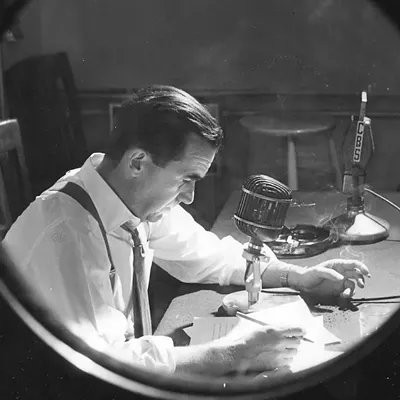
Michael Pachovas planned on being a professional football player. He had the size and strength from years of physical labor in his working-class upbringing. But a severe knee injury forced him to change course. Michael instead enrolled at Indiana University as a literature major and eventually joined the Peace Corps, believing the adventure would fulfill his desire to serve his country and "give [him] good material to write about."
At age 20, Michael was digging wells and laying bamboo-and-tar pipe systems in Ethiopia. It was there that he dove off a pier during a nighttime swim and hit something hard. The last thing he remembers of that night is floating, "drinking water," and his anger that this was how he was going to die. He did not die, but suffered a spinal cord injury that left him with quadriplegia. He eventually became one of our most effective disability activists.
I stumbled upon Michael's story while reading about the history of curb cuts. In a tale of gutsy and pragmatic guerrilla activism, Michael and some of his friends at UC Berkeley acquired concrete and added ramps to a series of inaccessible curbs in the middle of the night. He founded the Disabled Student Union and helped transform his college campus from approximately 10 percent accessible to almost fully accessible within five years — eventually with the sanction of the university and the help of a trained architect.
The changes at UC Berkeley weren't necessary because of anything unique to the campus. Every student had to navigate the school's hills, square cement curbs and sloped sidewalks. But only the students who used wheelchairs found these areas inaccessible. Expecting students with different needs and abilities to navigate the same terrain was unfair.
Around Spokane, the concept of fairness has been in hot debate, whether in school board meetings, during Spokane County redistricting hearings or when discussing criminal justice. In these settings fairness often goes by another name: equity.
Due to state law and the nearly 11 percent population increase since 2010, Spokane County is being redistricted, expanding its Board of County Commissioners from three to five. During the last public hearing of the Independent Redistricting Committee, representatives of the Coalition for Creating 5 Fair, Equitable Spokane County Commissioner Districts presented a draft map for the committee's consideration. Afterward, one gentleman took the mic to criticize their testimony. "He said 'equity,' not 'equality'!" the man announced, "It's a trick!"
Given how similar the words sound, referring to "equity" when people expect to discuss "equality" can feel like intentional sleight of hand. It's an important distinction, however, because while equity is a synonym for fairness, equality is not.
"Equity" literally means "the quality of being fair." While "equality" relies on the virtue of sameness, "equity" recognizes that different people may need different tools and accommodations to accomplish the same goal. Sameness may still be the ultimate goal (sameness in opportunity, in dignity, in access to physical or monetary resources), but to get there, different processes may be required, just as Pachovas needed different accommodations to have equal access to his college's sidewalks and buildings. Equity recognizes that treating different people the same can be just as unfair as treating the same people differently.
The concept of equity is easy to grasp when applied in familiar places. In fact, most people eagerly defend the need for equity when watch-dogging their own interests. Take hourly wages: Suppose I hire a laborer at 9 am and a second at 1 pm. When 5 pm rolls around, I pay each of them $80. The worker who started at 9 am would naturally be upset because while both workers made the same amount of money at the end of the day, the second worker was paid double the rate of the first. We expect fairness, not sameness, in regard to money, recognizing the differences that should be considered when deciding what is fair.
Yet when equity is raised as a value when discussing our schools, our voting and our police, it is often met with suspicion. This suspicion may be based in a genuine misunderstanding of the concept, but often it is a reaction to what the push for equity implies.
This may be because we often speak of racial equity. Racial fairness, and the need to proactively ensure it, acknowledges that some people are treated unfairly because of their race. Furthermore, it acknowledges this unfair treatment extends beyond personal interactions, affecting structural aspects of our local democracy: our schools, our voting and our police. Doing nothing to correct this injustice may meet the equality test, in that no one gets any help, but it does not pass the equity test.
If you don't believe racism affects education, the way district lines are drawn or how resources are distributed to different communities within a city or county, fine. (You're wrong, but fine.) An extra emphasis on fairness in an area with no disparity cannot hurt your interest: You'll be fine. And if you feel the lines being proposed by others will hurt your community, dive in and address this. Explain how your community will be harmed and propose your own solutions. Show how your proposal is fair.
But don't pretend that treating everyone the same is necessarily fair. It wasn't fair for Michael Pachovas when he tried to get to class, and it isn't fair for those in Spokane who are currently disadvantaged by unequal opportunity, power and representation. Don't simply sneer at equity and declare those who would champion it your enemies. Because to reject equity is to reject fairness itself. ♦
Jac Archer (they/them/theirs) is a local activist, community organizer and educator in the fields of diversity, equity, civic engagement and sexuality. Jac has a passion for institutional policy and making difficult concepts easily accessible.















